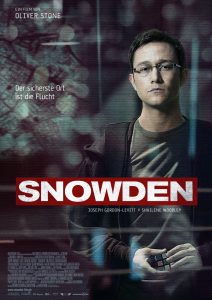Directed by Oliver Stone | Written by Stone and Keiran Fitzgerald, based on books by Anatoly Kucherena and Luke Harding | 134 min | ▲▲△△△
I have to own my bias on this one, just as I did with Pawn Sacrifice and another Joseph Gordon Levitt feature The Walk: These movies are all fictionalized takes on real life stories that have been handily captured in award-winning documentaries (Bobby Fischer Against The World and Man On Wire, respectively) all of which I’ve seen. It means the features had to work hard to surprise, and in many ways they did.
But I couldn’t find much about Snowden to recommend. It feels flat and dull compared to Laura Poitras’ Citizenfour.
Oliver Stone would seem to be the perfect guy to helm a feature on this material. The JFK filmmaker knows his way around secret conspiracies and American politics. But his direction here is lugubrious. He makes the story a relationship drama rather than deliver what it obviously is: a suspense thriller about the former CIA and NSA analyst who liberated secret information and then shared it with the world, forcing him to leave the United States for Hong Kong and eventually Russia, where he’s been at large since 2013.
We get to know Ed Snowden (Joseph Gordon Levitt) through his professional life—first as soldier, then an analyst. He shows a knack for surveillance software, but less so for spycraft. The personas arrayed around him—played by Rhys Ifans, Timothy Olyphant, and Nicolas Cage (who’s phoning in his three scene cameo)—all seem damaged or cynical in comparison to Snowden’s shining idealism, while we cut between flashbacks to Snowden’s various assignments and his giving the key documents over to journalist Glenn Greenwald (Zachary Quinto) and filmmaker Laura Poitras (Melissa Leo) in a Hong Kong hotel room, which was the core of Poitras’ documentary. Our hero—and put aside any doubt that the film might consider his choice treasonous—begins as a conservative, but his belief is shaken by what he sees in the intelligence field. And maybe his health—Stone touches upon his being an epileptic, but to little effect.
That Stone spends so much time in Snowden’s personal life—he struggles in his relationship with his girlfriend, Lindsay Mills (Shailene Woodley, who in early scenes sports one of the worst wigs I’ve seen in years) because of the stress of his secret work—feels like he’s burying the lead. A scene with the giant head of Ifans looming over Levitt is maybe the most impressive visual moment—very much like Ridley Scott’s Apple Mac advertisement in 1984—but these are fleeting.
What happened to Snowden once he passed on the information? How did he manage to avoid capture by American agents? How did his family react to his whistleblowing? And what about Lindsay? The film spends a lot of time with this couple, but then neglects to give us any kind of satisfying conclusion to their love story. How did she come to the decision to join him and give up her life in the US? We never find out.
If you want to be terrified by the ways the American government is slipping towards totalitarianism, and be awed by how one man betrayed his nation in an effort to save it, watch Citizenfour. Maybe avoid this missed opportunity while you put a plaster over the eye of your laptop camera.








